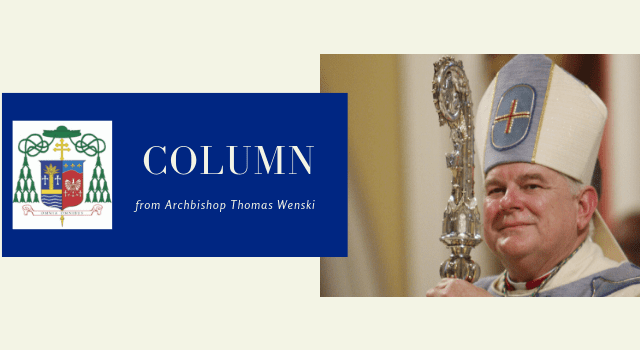As the summer progresses, we hope to put the pandemic in our rear-view mirror. We believe currently that prudence mandates that we continue our policy of wearing face masks and social distancing at Mass. However, we are reviewing our protocols weekly. Some may feel this as an unnecessary imposition, but compliance is surely an act of charity towards our neighbor.
The global health emergency has demonstrated that “no one can face life in isolation.” We are social beings – we can only become fully human in relationship to others. We long to belong – to a family, to a community, to a nation. Virtual relationships – even with loved ones through ZOOM or facetime – are no substitute for face-to-face encounters. And, as a family of faith, a community of the baptized, virtual Masses cannot long substitute for “full, conscious and active participation” at Mass in our parish churches.
As more people are vaccinated, many are returning to worship in person at their parish churches. However, in most cases, the parishes are still able to accommodate those returning even with the reduced capacity of social distancing. Some pundits suggest that the pandemic, which had people isolating themselves at home, accelerated the falloff in Mass attendance that was already evident before the pandemic and so, they say, many people will not be back.
And it is true, the ascendant secularism of our times has weakened many Americans’ religious identities. Mainline Protestant denominations are most affected – but it has not spared us Catholics. If “former Catholic” were a religious denomination, it would be second largest religious group in America. (The Catholic Church continues to be the largest – with about 20% of the American population.)
The strong individualism of our American culture does undermine the sense of a collective identity in which Catholicism is experienced as a distinctive way of life. Thus, those who call themselves spiritual but not religious usually associate faith with private rather than public spheres of life (the private involving personal experience, the public having to do more with institutions, creeds and ritual).We find people who say they believe but do not belong; and, as we see sometimes in many Catholics in public life (but not exclusively among them), we find those who say that they belong but who apparently do not believe.
Churches are seen as merely voluntary organizations and affiliation or non-affiliation a matter of personal taste or choice. Americans have become individual consumers of religion, picking their religious identity a la carte as it were. And so, where many people define themselves as spiritual but not religious, they may construct for themselves made-to-order creeds in which they profess to believe in Jesus (expressed sometimes very vaguely) but at the same time they do not believe in the Church.
If spirituality describes our struggle with issues of how our lives fit into the greater cosmic scheme of things, then for Catholics the personal act of faith (what the theologian calls the fides qua creditor) cannot be divorced from the content of faith itself (the fides quae creditor). Or as one of the ancient Fathers of the Church said: One could not claim God as Father without at the same time acknowledging the Church as Mother. The living out of our Catholic faith then is spirituality; but it is also necessarily a living out of that faith religiously.
Going to Mass “religiously” – on all Sundays and holy days – is what we Catholics do. It is the most obvious “marker” of a Catholic identity. The central act of our faith and the highest manifestation therefore of Catholic spirituality is participation in the Holy Eucharist seen as the source and summit of the Christian life. The recovery of Eucharistic practice – with renewed coherence and wonder– must be the path forward as we emerge from this pandemic, for the Eucharist – the Body and Blood of Christ – is the source of our healing and hope.

